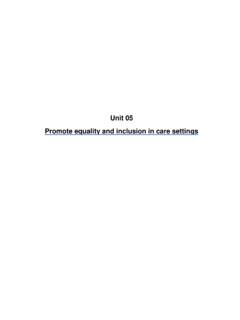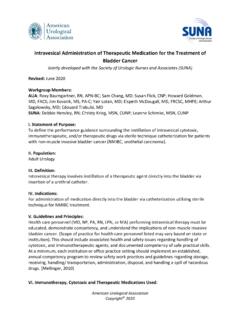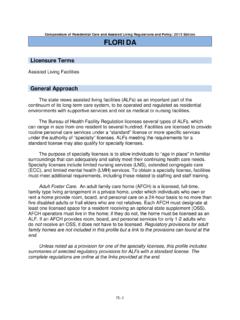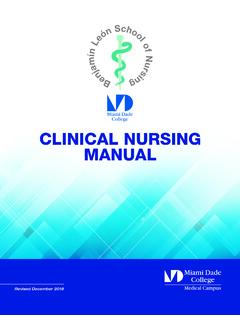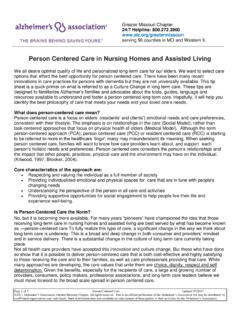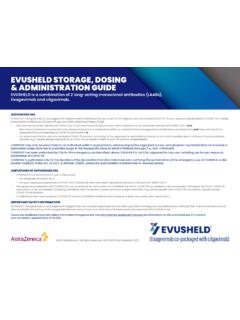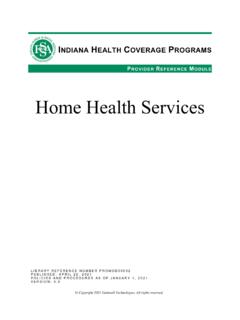Transcription of Unit 18 Support use of medication in social care settings
1 Unit 18 Support use of medication in social care settings 1 Unit purpose and aims This unit assesses the Support for use of medication in social care settings . It covers broad types, classifications and forms of medication , as well as safe handling and storage. It addresses practical Support for the use of medication that reflects social care principles and values and includes the need for accurate recording and reporting. The learner will: 1. Understand the legislative framework for the use of medication in social care settings 2. Know about common types of medication and their use 3.
2 Understand roles and responsibilities in the use of medication in social care settings 4. Understand techniques for administering medication 5. Be able to receive, store and dispose of medication supplies safely 6. Know how to promote the rights of the individual when managing medication 7. Be able to Support use of medication 8. Be able to record and report on use of medication 2 Identify legislation that governs the use of medication in social care settings Legislation in relation to medicines Legislation includes Acts of Parliament and government Regulations related to the Acts which are enforceable through the court system.
3 Guidance produced by government and official bodies such as the Royal Pharmaceutical Society reflect best practice. Guidance documents are based on legislation and clarify the law by summarising the main points. There are various Acts, Regulations and Guidance relating to medication , as well as legislative controls that govern the manufacture, sale, distribution, prescribing, dispensing, storage, labelling, and administration and safe disposal of drugs. The overall aim of this legislation and guidance is to: Protect service users from harm through the inappropriate use of drugs Provide all health care professionals with a comprehensive framework on which to base their clinical practice Reduce the risk of misuse of prescribed drugs which are addictive.
4 These require extra safe prescribing, handling, storage and disposal and are called Controlled Drugs Protect the public and the environment from potentially damaging methods of disposal of medicines. Although it is not essential for you to know the detailed content of all of the Acts, Regulations and Guidance it is important that you are familiar with the main ones which govern the supply, storage, administration and disposal of medicines - and that you comply with their requirements. These are primarily: The Medicines Act (1968) The Misuse of Drugs Act(1971) The Misuse of Drugs Regulations(2001) The Hazardous Waste Regulations(2005) The Misuse of Drugs (Safe Custody) Regulations 1973 (as amended 2007) The Human Medicines Regulations(2012) 3 The Health and social care Act(2012) The care Quality Commission s Fundamental Standards.
5 The fundamental standards are based on The Health and social care Act 2008 (Regulated Activities) Regulations 2014 (Part3). The main ways these impact day to day work in health and social care is summarised in the table below. Useful Guidance documents which explain the legislation are included in the table. Your workplace medication policies and procedures should reflect this legislation and guidance. Issues in practice Relevant Acts, Regulations and Guidance General principles of safe handling of medicines in social care settings These are covered by the Royal Pharmaceutical Society of Great Britain Guidance The Handling of Medicines in social care (2016) Consent and covert administration of medication (legal issues regarding hiding medicines in food and drinks) The Mental Capacity Act (2005) is the main law regarding individual s capacity to make decisions for themselves.
6 This, and the amendment called the Deprivation of Liberty Safeguards underpin policies on how to manage medication for individuals who do not have capacity to consent, such as some people with advanced dementia (more on thisbelow). How medication is classified and how it can be obtained For many years, almost all aspects of medication were determined by the Medicines Act 1968. Most of this Act has now been replaced by the Human Medicines Regulations 2012. The original classification of medicines as General Sales (can be obtained in general shops), Pharmacy (only available with a pharmacist overseeing the sale), Prescription only and Controlled Drugs (addictive drugs needing special control) continues.
7 4 Controlled Drugs classification Controlled drugs were originally classified under The Misuse of Drugs Act (1971). This was to protect the public from misuse of those medicines considered particularly dangerous as they are potentially addictive, such as morphine. More recently some controlled drugs were reclassified by the Misuse of Drugs Regulations (2001). Storage of medication The Royal Pharmaceutical Society guidance The Handling of Medicines in social care describes the requirements for safe storage of medicines in different settings (such as a person s own home, a care home or in children and young people s settings ).
8 The correct storage of Controlled Drugs is determined by The Misuse of Drugs (Safe Custody) Regulations 1973 (as amended 2007). Handling of medication in healthcare settings (such as hospitals and care homes providing nursing care ) is usually carried out by Registered Nurses. care workers may be trained to handle medication in these settings but the Registered Nurse delegating this remains accountable too. Detailed guidance for nurses and midwives on prescribing, obtaining medicines, administration, storage and disposal of medication is available from the Nursing and Midwifery Council (NMC) Guidance Standards for Medicines Management (2015).
9 5 Issues in practice Relevant Acts, Regulations and Guidance Recording the administration of medication correctly Although the Commission for social Inspection (CSCI) was abolished in 2009 and replaced by the care Quality Commission, the CSCI guidance called Professional advice: Medicine administration records (MAR) in care homes and domiciliary care is still helpful. The Health and social care Act 2012 requires health and social care settings to maintain accurate and up to date records regarding medication . Confidentiality of medication records The Data Protection Act (1998) is the main legislation protecting the confidentiality of medical records including those relating to medicines.
10 Disposal of medication The Hazardous Waste Regulations 2005 changed the way medicines are disposed of. Pharmacists must now hold a waste management license to dispose of medication legally. All medicines from social care settings requiring disposal must be returned to a suitably licensed pharmacist. care homes registered for nursing care must denature controlled drugs in a special box prior to collection by a licensed waste company. Inspection of medication records and practices The Health and social care Act 2012 requires health and social care providers to follow correct procedures and make records of medication handling, storage, usage and disposal.





